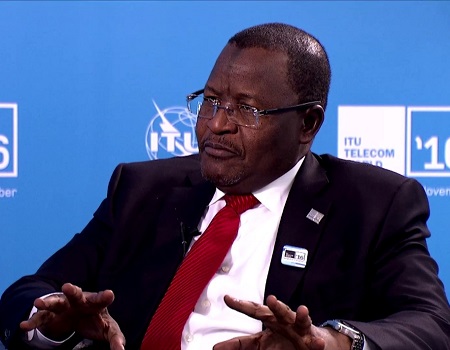THE Executive Vice Chairman of the Nigerian Communications Commission (NCC), Professor Umar Danbatta has said the Commission recently reduced from 40 million to 32 million.
Professor Danbatta disclosed this at the Post-Nigeria National Broadband Plan 2013-2018 organised by the Association of Telecoms Companies of Nigeria (ATCON).
He said that internet access in the rural areas is majorly running on 2G while in the urban areas, 3G and 4G are the dominant networks.
Professor Danbatta said there were plans to deploy broadband infrastructure to these rural areas so that they could have access to good internet network.
We have close to 200 access gaps in the country. These access gaps are actually in rural areas. So we know where the access gaps are and therefore the fund is being targeted to plug these access gaps.
We are doing that by deploying more and more base conceiver stations. And as well as recently we have experimented and did a pilot on how we can deploy a rural technology based broadband solution in order to even bridge the gaps faster so there is a provision in the 2018 and 2019 budget for deployment of this rural technology solution that will bridge the gaps in the rural areas faster.
We have succeeded in bringing down the number of the access gaps from over 200 to about 190 and we have cut down on the number of Nigerians that do not have access to the internet services from close to 40 million to around 32 million as we are talking now”.
ALSO READ: Ndigbo, Hausa/Fulani communities, others pledge block votes for Saraki…
Furthermore, he said “as you are aware in the rural areas, the dominant network is 2G. So these rural areas or areas that are underserved or unserved are areas where we have not succeeded in really achieving the broadband penetration of 30 per cent. But because we are using figures in terms of 3G and 4G penetrations those figures speak for themselves and therefore the concentration on statistics to the attainment of the 30 per cent target, in fact, we have exceeded the target.
What we envisaged is that there will be a massive deployment of broadband infrastructure in rural areas that is areas that are unserved and underserved. The whole idea is that in those areas we intend to have at least a fibre access point in virtually all the 774 local government areas in the country.
Our hope is that by the time this massive deployment of our broadband infrastructure takes place and concluded, we hope to see the penetration hit a 70 per cent even though it has not been conclusively agreed upon but I will like to assure Nigerians of our readiness to see the deployment of broadband infrastructures”.
The Minister of Communication, Barrister Adebayo Shittu in his submission said Nigeria through the years has been improving its use of ICT enabled services to drive socio-economic activities and has created enormous need for sustainable broadband capacity and improved quality of services.
He expressed delight to address strategic Stakeholders on the occasion of Post – Nigeria National Broadband Plan 2013 – 2018, which is expected to preview our performance with the exited broadband plan and collate suggestions for the development of the new strategic plan 2019 – 2023.
He recalled that the Nigerian National Broadband Council was established to provide periodic evaluation of progress, facilitate coordination and collaboration and highlight areas of program adjustment to permit the realization of new and emerging opportunities.
In his address, the President of ATCON, Mr Olusola Teniola said the purpose of this meeting is principally to see how the entire industry could work towards achieving a greater broadband penetration (the industry suggests 70% as being realistic) in the next five years by removing, collectively those obstacles that worked against the initial plan.
He also said the strategic underlining purpose of this meeting is principally to see how the entire industry (Telecoms/ICT) can harness our collective energy in achieving the above- mentioned target.
He noted that the previous plan has helped all stakeholders to have a focus as to what should have been done to ‘shift the dial’ in deepening the broadband penetration.
“Now that the plan has come to an end the industry needs a new one as a matter of urgency in order to the lay a further foundation leading the industry to a truly digital transformation that has 5G as a central vehicle for collaborative innovations to grow our GDP and raise our GDP per capita in five years’ time”, he said.
WATCH TOP VIDEOS FROM NIGERIAN TRIBUNE TV
- Relationship Hangout: Public vs Private Proposals – Which Truly Wins in Love?
- “No” Is a Complete Sentence: Why You Should Stop Feeling Guilty
- Relationship Hangout: Friendship Talk 2025 – How to Be a Good Friend & Big Questions on Friendship
- Police Overpower Armed Robbers in Ibadan After Fierce Struggle





